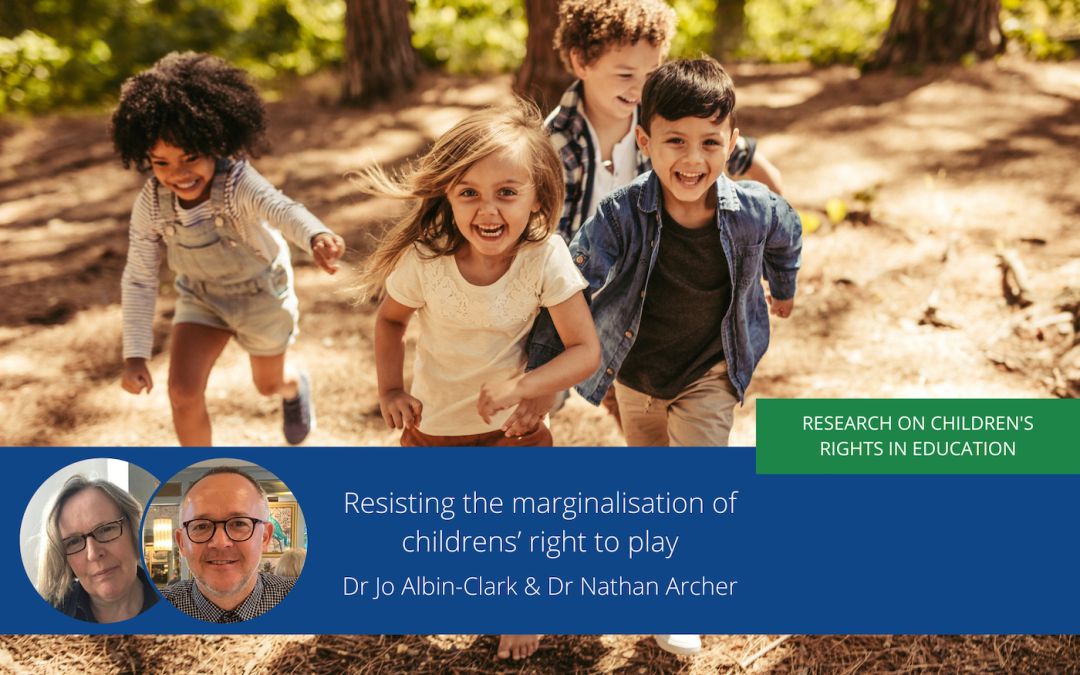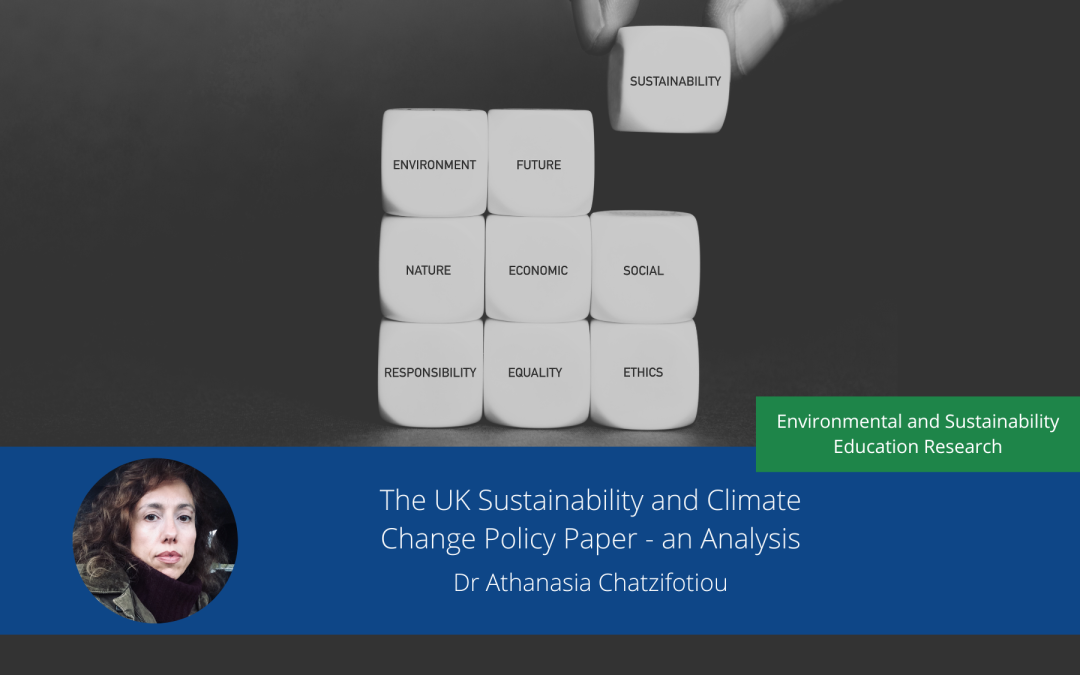
Resisting the marginalisation of children’s right to play
Why have we, as educators, accepted that play now occupies the margins of early childhood education and care? Whilst a long tradition of international research positions play as essential to early learning (Wood, 2015), tensions remain with play being foregrounded in classroom life. But can – and should – educators subvert the marginalisation of play in early childhood and care (ECEC)? It is one question that has provoked the recent scholarship on the resistance practices of educators. Dr Jo Albin-Clark and Dr Nathan Archer share their research and thoughts on the marginalisation of play in education.
Play in the current context
Over time, as researchers in ECEC, we have found that play seems to have slipped down the agenda in the push for formalised learning in countries such as England, as accountability bodies frame teaching within standards agendas that can sideline child-initiated play (Wood, 2019). Play seems to occupy a contested curriculum space (Fairchild and Kay, 2021, p. 1). Yet play is not just under erosion in school life, the pull of structured time and the chasing of high achievements reaches into family life (Sahlberg and Doyle, 2019). The result is the withholding of play from children (Murray et al., 2019).
But play is much more than educational experiences. It is deeply associated with childhood itself. The entitlement to play is part of Article 31 of the United Nations Committee on the Rights of the Child (UNCRC) (Office for the High Commissioner for Human Rights OHCHR, 1989). Significantly, the right to play is an innovative component that acts as a gateway to other rights related to health and broader development (Davey and Lundy, 2011). Even though play is strongly associated with many domains of learning and development, it is not always taken seriously and because of that the status of play has suffered (Brooker and Woodhead, 2013).
Resistance practices
Play is a matter of social justice (Souto-Manning, 2017), and, for that reason, needs policymakers and educators to protect children’s entitlement to play, including through resistance to its marginalisation. As such, a growing body of literature in early childhood education (Moss 2019; Archer and Albin Clark 2022) focuses on the multiple manifestations of these resistances by educators. Much of this resistance scholarship takes an explicit social justice position, with reconceptualist writers having increasingly called for greater advocacy and social activism in terms of both policy and practice (e.g., Bloch et al., 2018). Research reveals how the scope and scale of this resistance and activism varies from micro resistances to collective action. Nonetheless, both small and large-scale actions can produce sites for hopeful and flourishing pedagogies that can shift from marginalisation to more active politicised resistance.
Resistance stories
Building on this prior work, we came together as researchers with two cases from separate studies (Albin-Clark, 2018; 2022; Archer, 2020; 2021). What is common to both case studies is a shared interest in how ECEC educators make sense of their experiences and enact forms of resistance. Through the stories of two early childhood educators working in England, we identified their commitment to ‘being the right thing’ and ‘doing the right thing’, foregrounding play in their practice as a matter of social justice. As such, both educators resisted and subverted pressures, scrutiny, and colleague expectations to make play happen, and demonstrate how play is implicated with concerns of justice (Nicholson and Wisneski, 2017).
Call to arms
In conclusion, we need to further problematise the implications and risks of mobilising play (Shimpi and Nicholson, 2014). Making play happen requires a critical awareness of the relationship between rights and play agendas and the tensions involved navigating the value of play in the complexity of ECEC (Wong, 2013). Saying ‘no’ to play’s marginalisation brings teachers into a professionalism founded on resistance (Fenech et al. 2010).
Now is the time to acknowledge and amplify resistances that promote the right to play. But for educators there are risks of being labelled a ‘disobedient’ professional (Leafgren, 2018). In promoting play, it can mean thinking carefully about how curriculum content is framed (Wood and Hedges, 2016). Moreover, children’s access to and entitlement to play is positioned as a moral imperative by both educators in our studies, which suggests how seriously the right to play is positioned (Nicholson and Wisneski, 2017; Wood, 2007). Social justice needs serious play.
Key Messages
- Play has an essential role in children’s educational lives and matters to their childhood.
- Play and educational justice are related concepts.
- There are both implications and risks in marginalising children’s right to play.
- The increasing formalisation of education for our youngest children needs scrutiny.
- Making play happen in educational practice might need forms of resistance.

Dr Jo Albin-Clark
Senior Lecturer Early Education
Dr. Jo Albin-Clark is a senior lecturer in early education at Edge Hill University. Following a teaching career in nursery and primary schools, Jo has undertaken a number of roles in teaching, advising and research in early childhood education. She completed a doctorate at the University of Sheffield in 2019 exploring documentation practices through posthuman and feminist materialist theories in early childhood education. Her research interests include observation and documentation practices and methodological collaboration and research creation through posthuman lenses. Throughout her work, teachers’ embodied experiences of resistances to dominant discourses has been a central thread.
https://orcid.org/0000-0002-6247-8363
https://research.edgehill.ac.uk/en/persons/joanne-albin-clark

Dr Nathan Archer
Researcher at Leeds Beckett University
Dr Nathan Archer is a researcher at Leeds Beckett University. Originally qualified as a Montessori teacher, Nathan has worked in practice, policy and research in early childhood education for twenty-five years. He gained a PhD from University of Sheffield in 2020 and has undertaken policy analysis with Sutton Trust, Nuffield Foundation and University of Leeds. He continues to research early childhood workforce policy, and the resistance and activism of early childhood educators. Nathan is Associate Editor of Journal of Early Childhood Research.
Other blog posts on similar topics:
Albin-Clark, J. (2018). ‘I felt uncomfortable because I know what it can be’: The emotional geographies and implicit activisms of reflexive practices for early childhood teachers. Contemporary Issues in Early Childhood, 21(1), 20-32. https://doi:10.1177/1463949118805126
Albin-Clark, J. (2022). The right to play: Are young children free to determine their own actions? https://blogs.edgehill.ac.uk/isr/the-right-to-play-are-young-children-free-to-determine-their-own-actions/
Albin-Clark, J. & Archer, N. 2023, “Playing social justice: How do early childhood teachers enact the right to play through resistance and subversion? ” Prism: Casting new light on learning, practice and theory, 5 (2), 1-22. https://doi.org/10.24377/prism.article714
Archer, N. (2020). Borderland narratives: Agency and activism of early childhood educators [Doctoral dissertation, University of Sheffield]. https://etheses.whiterose.ac.uk/27993/
Archer, N. (2021). ‘I have this subversive curriculum underneath’: Narratives of micro resistance in early childhood education. Journal of Early Childhood Research https://doi:10.1177/1476718X211059907
Archer, N. & Albin-Clark, J. (2022, July 20). Telling stories that need telling: A dialogue on resistance in early childhood education. FORUM for Promoting 3-19 Comprehensive Education, 64 (2) https://journals.lwbooks.co.uk/forum/vol-64-issue-2/abstract-9564/
Bloch, M. N., Swadener, B. B., & Cannella, G. S. (Eds.). (2018). Reconceptualizing Early Childhood Education and Care-a Reader: Critical Questions, New Imaginaries & Social Activism. Oxford: Peter Lang.
Brooker, L., & Woodhead, M. (2013). The right to play. early childhood in focus, 9. The Open University with the support of Bernard van Leer Foundation
Davey, C., & Lundy, L. (2011). Towards greater recognition of the right to play: An analysis of article 31 of the UNCRC. Children & Society, 25(1), 3-14. https://doi:10.1111/j.1099-0860.2009.00256.x
Fairchild, N., & Kay, L. (2021, November 26). The early years foundation stage: Challenges and opportunities. BERA blog. https://www.bera.ac.uk/blog/the-early-years-foundation-stage-2021-challenges-and-opportunities
Fenech, M., Sumsion, J., & Shepherd, W. (2010). Promoting early childhood teacher professionalism in the Australian context : The place of resistance. Contemporary Issues in Early Childhood, 11(1), 89-105. https://doi:10.2304/ciec.2010.11.1.89
Leafgren, S. (2018). The disobedient professional: Applying a nomadic imagination toward radical non-compliance. Contemporary Issues in Early Childhood, 19(2), 187-198. https://doi:10.1177/1463949118779217
Moss, P. (2019). Alternative narratives in early childhood. Abingdon: Routledge
Murray, J., Smith, K., &Swadener, B. (2019). The Routledge international handbook of young children’s rights Abingdon: Routledge. https://doi:10.4324/9780367142025
Nicholson, J., &Wisneski, D. (2017). Introduction. Early Child Development and Care, 187(5-6), 788-797. https://doi:10.1080/03004430.2016.1268534
Office for the High Commissioner for Human Rights, (OHCHR). (1989, November 20). United Nations Convention on the Rights of the Child (UNCRC)https://www.ohchr.org/enhttps://www.ohchr.org/en
Sahlberg, P., & Doyle, W. (2019). Let the children play. Oxford: Oxford University Press.
Shimpi, P., & Nicholson, J. (2014). Using cross-cultural, intergenerational play narratives to explore issues of social justice and equity in discourse on children’s play. Early Child Development and Care, 184(5), 719-732. https://doi:10.1080/03004430.2013.813847
Souto-Manning, M. (2017). Is play a privilege or a right? and what’s our responsibility? on the role of play for equity in early childhood education. Early Child Development and Care, 187(5-6), 785-787. https://doi:10.1080/03004430.2016.1266588.
Wong, S. (2013). A ‘Humanitarian Idea’: using a historical lens to reflect on social justice in early childhood education and care. Contemporary Issues in Early Childhood, 14(4), 311-323.https://doi.org/10.2304/ciec.2013.14.4.31https://doi.org/10.2304/ciec.2013.14.4.31
Wood, E. (2007). New directions in play: consensus or collision? Education 3-13, 35(4), 309-320. https://doi:10.1080/03004270701602426
Wood, E. (2015). The capture of play within policy discourses: A critical analysis of the UK frameworks for early childhood education. In J.L. Roopnarine, M.Patte, J.E. Johnson & D. Kuschner (Eds.), International perspectives on children’s play (pp. 187-198). Buckingham: Open University Press.
Wood, E. and Hedges, H., 2016. Curriculum in early childhood education: Critical questions about content, coherence, and control. The curriculum journal, 27(3), pp.387-405.






